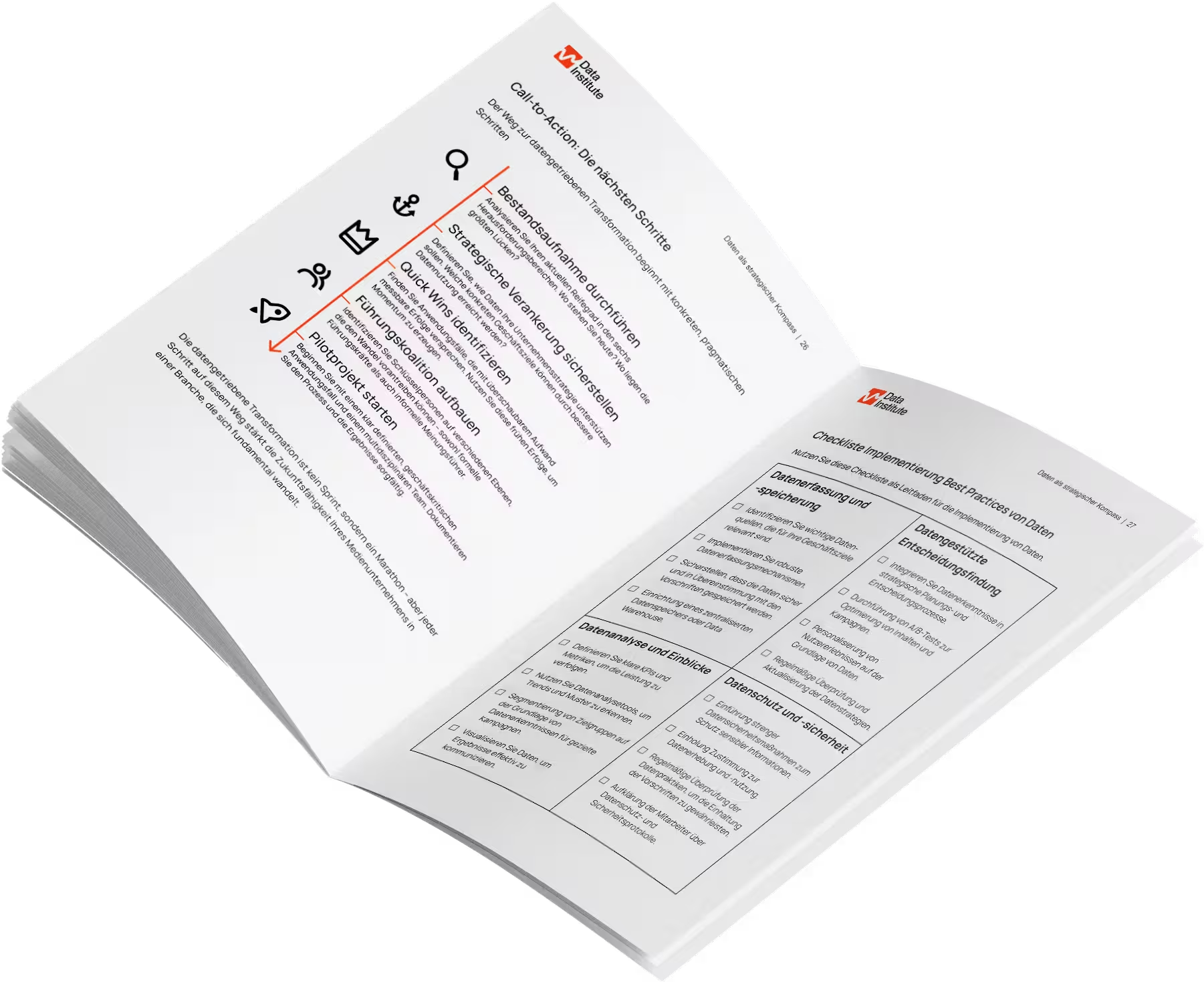The foundation of the future


The roadmap for data-driven transformation
The ePaper shows you strategies, success stories and a checklist for a direct start into the digital future.

- Das ist eine H2
- Das ist eine H3
TLDR: A true digital mindset is only complete through the triad of culture, data governance and data quality. I summarize the essential connections and share my mission as co-founder of the Data Institute to support companies on this holistic journey.
In the last articles in this series, we have dealt intensively with the human mindset and the Strategies to overcome cultural resistance discussed. We have Managers as catalysts and employees as co-designers considered. Today we are closing this circle and looking at the “bigger picture”: Like all these elements — culture, Data Governance and data quality — are inextricably linked and form the true foundation for success in a data-driven world.
The triad for success: Culture, Data Governance & Data Quality
The success of a data-driven transformation is based on this proven triad. These three pillars cannot be considered in isolation, but work seamlessly together to generate sustainable added value from data.
Data governance as a framework for trustworthy data: Data governance is the framework of policies, processes, and clear responsibilities that controls the entire life cycle of data in the company. It is the foundation on which trustworthy and high-quality data is created. Without it, companies risk faulty analytics, inefficiency, and serious compliance violations. It ensures that data is consistent, consistent, and secure.
Data quality as a basic requirement (“garbage in, garbage out”): High-quality data is the basic requirement for reliable analyses and well-founded decisions. In the age of artificial intelligence (AI), this is winning Garbage In, Garbage Out Principle A new urgency: Even the most advanced algorithms are unable to gain valuable insights from faulty data. Robust data governance is the basis for ensuring this quality.
How culture brings these frameworks to life in the first place: The best strategy and cutting-edge technology are worthless if the corporate culture isn't ready to “breathe” change. Culture is the decisive factor that brings these technical and organizational frameworks to life. It is about employees recognizing the value of data and basing their decisions on it. Without leadership that exemplifies change, every strategy remains piecemeal.
The analogy: ploughing the field
In this series, I have emphasized several times that transformation is a marathon, not a sprint. It's like redesigning a field: You can't just throw new seeds (data initiatives) on unprepared soil and expect a rich harvest (results).
The soil must be carefully prepared:
- Old habits like silo thinking must be broken
- Nutrients in the form of data literacy must be added
- The right conditions, such as psychological safety and a culture ready to learn, must be created
Only when this “field” (your corporate culture) is prepared can the seeds of data initiatives flourish and produce a rich harvest in the form of valuable insights and new business successes.
Why do so many companies fail? The most common traps
From my experience as a consultant and co-founder, I see the same patterns over and over again when companies stumble during their digital transformation:
- The “technology-first” mistake: Companies buy the latest BI software or AI platform and wonder why they still end up with Excel spreadsheets after a year. Technology is just a tool — without people who want to understand and use it, it is useless.
- The “big bang” approach: Some are trying to transform their entire organization overnight. This usually leads to excessive demands and resistance. Successful transformations start small, create quick wins and build trust.
- The “Data Team Island” effect: A highly specialized data team is set up, but works in isolation from the rest of the organization. Without bridges to the specialist areas, solutions are created that do not meet real needs.
- The “governance bureaucracy”: Data governance is understood as a pure compliance exercise, with endless sets of rules and approval processes. This stifles innovation instead of promoting it. Governance must enable, not prevent.
My Mission & The Data Institute
My biggest learning journey as an executive and co-founder of The Data Institute was the insight: Digital transformation is primarily a human transformation. I've often seen companies invest a great deal of money in new technologies and yet fail — not because of technology, but because of people.
This is exactly where The Data Institute's mission comes in: We are convinced that successful data projects are created in people's minds and hearts, not just in the systems. Our goal is to support companies on this journey, to master the human side of digitization and to avoid the typical pitfalls. We want to empower you and your teams to use data independently and make data-driven decisions.
Our conviction: A data-driven culture is not created through instructions from above, but through understanding, experiencing and gradually empowering. Every employee — from controller to editor — can and should be able to use data for their daily decisions.
Our Approach: We combine technical expertise with a deep understanding of change management. Because the best data strategy is of no use if it fails due to human reality.
Specific steps for your success
At the end of this series, let me once again summarize the most important recommendations for action:
Can be implemented immediately:
- Identify 2-3 “data champions” across different departments and empower them
- Start with a manageable pilot project that delivers measurable results in 8-12 weeks
- Establish weekly “data moments” in existing meetings
- Make your own decisions as a manager more transparent based on data
Build up in the medium term:
- Develop a data literacy program for all levels of employees
- Define clear data governance roles and responsibilities
- Implement data quality metrics and make them visible
- Create cross-functional teams that break through silos
Anchoring for the long term:
- Integrate data literacy into job postings and employee interviews
- Establish a culture of experimenting and learning from data
- Integrate data usage into your incentive systems
- Measure cultural change as well as technical KPIs
The reward: A truly data-driven organization
The reward for this marathon is an agile, innovative and truly data-driven organization that secures sustainable competitive advantages. Projects like the one at MediaPrint show that this holistic approach works: 87% less manual reporting effort, 94% acceptance rate for new data tools and above all — happier employees who find their work more meaningful and sustainable.
It is a journey that requires courage, persistence, and a clear vision. But it is also a journey that is worthwhile — not only for the company, but for each individual employee who can suddenly make more informed decisions and better understand their contribution to the whole.
Outlook and further dialogue
The journey to a data-driven organization is complex, but it is the key to sustainability. In the upcoming articles, we will look at other exciting aspects: How AI is accelerating this transformation, which new roles are emerging and how the working world is changing as a result.
I invite you to continue this dialogue: What was the most important insight for you from this series on data-driven transformation? And which topics would you like to see for future contributions?
Write to me — I am looking forward to exchanging ideas and shaping the future of the data-driven working world with you!
Picture: Zhu Jia Bin On Unsplash

Follow us on LinkedIn
And stay informed about data topics.
Follow us on LinkedIn
And stay informed about data topics.

Follow us on LinkedIn
And stay informed about data topics.

Related case studies
There are suitable case studies on this topic
Which services fit this topic?





